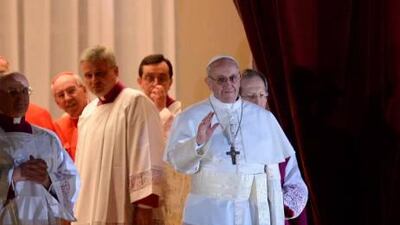VATICAN CITY // Cardinal Jorge Mario Bergoglio of Argentina was elected yesterday as the first non-European pope in more than a thousand years, a choice that reflects the shifting demographics of the Roman Catholic faith.
He chose the name of Pope Francis I for his pontificate and was greeted by thousands of cheering followers as he stepped out on a balcony overlooking St Peter's Square to be presented to the world for the first time as pope.
"Brothers and sisters, good evening," the 76-year-old said in Italian in his first words to his faithful.
The archbishop of Buenos Aires, speaking with a slight Latin American accent, joked with the crowd before delivering his blessing, saying: "As you know the duty of the conclave is to give Rome a bishop. It seems that my brother cardinals went almost to the end of the world."
He had reportedly finished second in the 2005 conclave that produced Pope Benedict XVI – who last month became the first pope to resign in 600 years.
After four inconclusive votes by the conclave, white smoke poured yesterday evening from a chimney on the roof of the Sistine Chapel to proclaim a new leader for the worldwide congregation of 1.2 billion Catholics.
Tens of thousands of people braving Rome's late burst of wintry weather greeted the symbolic signal with loud cheering, many shouting "Habemus Papam!" or "We have a pope!" – as the bells of St. Peter's Basilica and churches across Rome pealed.
The wait had turned out to be shorter than some expected, with Italian media having speculated that a choice for the 266th Pope would not be made until today as there was no clear front-runner and that the church had been in turmoil following the upheaval unleashed by the former's pope's surprise resignation.
"I can't explain how happy I am right now," said Ben Canete, a 32-year-old Filipino, jumping up and down in excitement.
Latin Americans reacted with joy to the news. Near the cathedral in Argentina's capital, Martha Ruiz burst into tears of emotion at news that her cardinal had been named pope.
She says the news was "incredible".
At the St. Francis of Assisi church in the colonial Old San Juan district in Puerto Rico, church secretary Antonia Veloz exchanged jubilant high-fives with the priest.
It was almost exactly an hour after the appearance of the white smoke that lights were switched on behind the curtains of the balcony in front of St Peter's Basilica. This led to spontaneous chants in Italian of "long live the Pope".
After a further few minutes of suspense, the French cardinal Jean-Louis Tauran stepped on to the balcony to announce, in Latin, the new Pope's name, with the square erupting into rapturous cheering. The new pope, solemn in his white robes with only the faintest hint of a smile, awaited his moment to speak.
He expressed gratitude to the cardinals who had chosen him and acknowledged the crowds' warm reception before leading them in prayer for his predecessor, Benedict.
The relatively swift decision can be seen as a sign that there was heavy support for the church's new leader from the start of the conclave.
The conclave also played out against revelations of mismanagement, petty bickering, infighting and corruption in the Holy See bureaucracy. Those revelations, exposed by the leaks of papal documents last year, had divided the College of Cardinals into camps seeking a radical reform of the Holy See's governance and those defending the status quo.
The new pope, of Italian descent, inherits from his German predecessor a church that's been rocked by sex-abuse scandals amid a waning profile in an increasingly secular West. His biggest challenge is to restore the reputation of the millennia- old institution and attract believers to a faith outstripped by Islam in terms of global numbers.
He's the first Jesuit to be elected Pope. In another move without precedent, Pope Bergoglio adopted the name of Francis, one of the church's most revered saints who was a beggar in 13th century Italy. The name is widely interpreted as sign of humility.
In his brief address, he asked the crowd in St. Peter's Square to pray for him "before I offer a blessing to you".
The emission of black smoke after the earlier votes showed that the cardinal had not at those stages reached the required two-thirds majority.
The Vatican spokesman Federico Lombardi had dismissed suggestions that the inconclusive votes when the process began on Tuesday and then, for much of yesterday, reflected disunity.
He said "perfectly normal" for there to be no quick result, adding: "One should not interpret this as being division or divisiveness among the cardinals, take into consideration the size of the group and the normal process."
Indeed, only one pope – Pius XII, in 1939 - had been chosen within three ballots since the start of the 20th century. Benedict was chosen after four votes in 2005 but was a clear favourite beforehand whereas no front-runner was identified in the build-up to this week's conclave.
*With additional reporting by Associated Press, Reuters, Agence France-Presse and Bloomberg News


